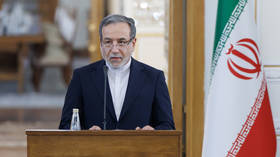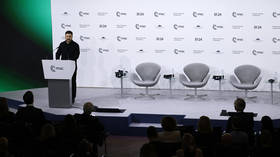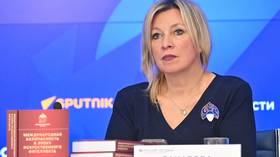Assad to nation: ‘The victory is near’
President Assad accuses "foreign conspirators" of efforts to destabilize the situation in Syria. Addressing the nation, he claimed that the international community’s aim to cause “psychological collapse” has failed and the victory is near.
“The existence of an external conspiracy is obvious to everyone,” Assad said, addressing the nation at Damascus UniversityHe accused the international community of trying to use Arab countries as cover for interference in Syria. Assad was critical of the Arab League monitoring mission, saying it had failed."The Arab League failed for six decades to protect Arab interests," Assad said. "We shouldn't be surprised it has failed today."Assad accused the Arab League of hypocrisy over calling for reforms in Syria. He added that the Arab League knows nothing about democracy and is a mirror for failures in the Arab world. However, he suggested the observers could still help find a solution. Speaking about "reforms", Assad said the west is not interested in reform. "The foreign plot is against reform in Syria," he said. However, he added that "victory is near" if Syrians remained steadfast.The Syrian leader dismissed opposition claims of a bloody crackdown, saying he is fighting armed insurgents who are using peaceful protests as cover.The president denied that any order had been given to fire on protesters other than in self-defense. He said there was no "cover-up" of any killings, and claimed that some people had been arrested by the state where there was overwhelming evidence of criminal activity.In his first speech since the Arab League’s observers were allowed to come to Syria, President Bashar Assad said he would not step down, insisting that he still has his people's support, despite a 10-month-old uprising against him."When I leave this post, it will be also based upon the people's wishes," he said.
‘Arab League not the ones to point finger at Assad’
An international consultant and former Belgian MP, Lode Vanoost, told RT that the international community, and the Arab League in particular, should focus on forcing the sides of the Syrian conflict to sit down and negotiate, instead of exacerbating the situation.“If you are encouraging these violent opponents not to talk to their own president then you are indeed intervening in a conflict within a country,” he said.Vanoost agrees that Assad is clearly not what one would call a democratic leader, but says he is “clearly not the worst one.”“[Assad] is right in saying that they are not the ones that should point a finger at him,” he said. “Who does the Arab League represent? Bahrain? The United Arab Emirates? Saudi Arabia? They are feudal monarchies.”Vanoost believes that Assad accepted the presence of the Arab Leagues observers, who, according to him, are “unrepresentative of democratic values,” because he had no other choice but to work with the “instruments” he had access to.“The Arab League could indeed do some good work there, but apparently that’s not what they are doing,” Vanoost said. “And of course there is a matter of the credibility. The problem is who else are you going to send? Are you going to send again people from Europe, the former colonials etc? No, it has to come from within Arab countries.”
Beirut-based political analyst Kamel Wazne believes that some Arab countries have adopted the US agenda and will raise no objections if Syria slides into civil war if it keeps the country from being a major regional power. Nevertheless he believes that Assad has really solid support among Syrians, who have witnessed how the country has changed over the last decade.“[Assad] has a solid record on politics, on education, on infrastructure, on investment, so there is really solid support for the president,” Wazne explained. “I think the Assad regime is listening to the people and the president has promised reforms. He promised constitutional reform and he put a deadline by March, and he said he is going to put a referendum to the people.”“And that is what has really upset a lot of these Arab countries which do not have democracy themselves,” Wazne added. “They talk about democracy, they talk about the rule of law, but they have none.”














